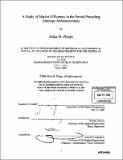A study of market efficiency in the period preceding earnings announcements
Author(s)
Phipps, Alika M
DownloadFull printable version (959.7Kb)
Other Contributors
Massachusetts Institute of Technology. Dept. of Mechanical Engineering.
Advisor
Warren Seering.
Terms of use
Metadata
Show full item recordAbstract
The Efficient Market Hypothesis, which has been one of the fundamental propositions of finance for over 30 years, implies that an investor, whether he is an amateur or a professional trader, cannot consistently beat the market. In this study, we examine if this theory holds in the period preceding an earnings announcement, by testing whether there is a relationship between stock returns before and after an earnings announcement. We find that there exists a negative correlation between pre-earnings returns and post-earnings returns for small capitalization stocks that could be explained by investor irrationality. This relationship is statistically significant for pre-earnings returns calculated up to a 10 day period preceding an earnings announcement and strongest over a 3 day period. We also tested to see if there was a correlation between the earnings results in the last quarter and the movements in stock price prior to this quarter's earnings announcement, and did not observe any statistically significant outcomes.
Description
Thesis (S.B.)--Massachusetts Institute of Technology, Dept. of Mechanical Engineering, 2006. Includes bibliographical references (leaf 23).
Date issued
2006Department
Massachusetts Institute of Technology. Department of Mechanical EngineeringPublisher
Massachusetts Institute of Technology
Keywords
Mechanical Engineering.